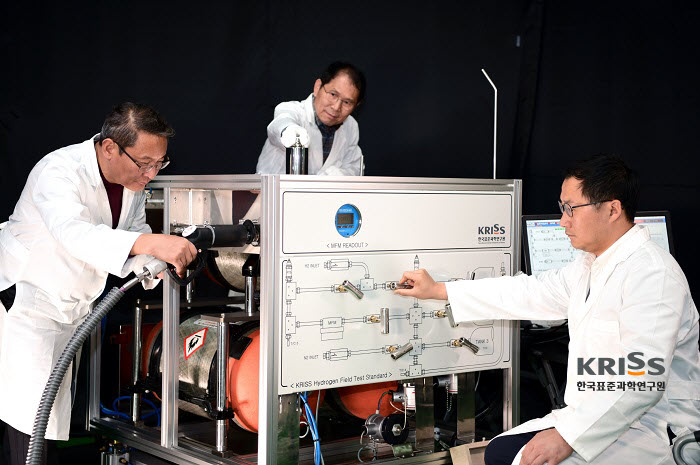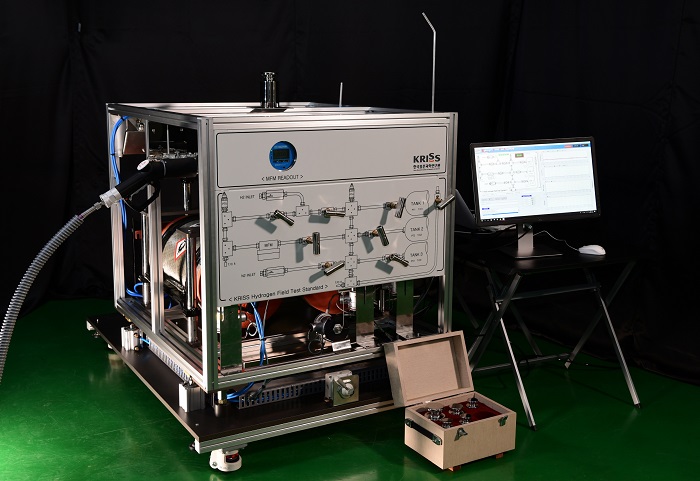
Korea Research Institute of Standards and Science (KRISS) has developed the core technology of quantitative charging, which is directly related to the commerce fairness in the era of the hydrogen economy.
Kang Woong, a research team at KRISS Thermal Fluid Standards Center, has succeeded in developing a calibration system that verifies the flowmeter so that a fixed amount of hydrogen can be charged at the hydrogen station. With the exact amount of hydrogen charged by the consumer, the commerce credibility is expected to rise and spread the hydrogen car.
The system is portable and can be calibrated immediately and accurately anywhere in the country’s hydrogen station.
Hydrogen cars, which are the representatives of eco-friendly cars, operate on electricity generated by the chemical reaction of charged hydrogen. Hydrogen cars can run up to 600 km on a single charge, which is considered to be very good in terms of energy storage compared to 400 km electric cars.
The excellent storage capacity of the hydrogen car is made possible by filling the hydrogen gas under severe conditions of high pressure and low temperature. In order to increase the filling efficiency in the limited storage tank volume, it is necessary to maintain a high pressure of 700 bar and a low temperature of minus 40 ° C.
Currently, hydrogen stations are paying for their charge. The amount is charged by the mass value of the hydrogen gas measured by the flow meter in the charger. As such, the hydrogen flowmeter plays a role in the fairness of the transaction costs of hydrogen, but until now, since hydrogen is placed under severe conditions of high pressure and low temperature unlike hydrogen, the flow rate measurement is very difficult and the results are uncertain.
The OIML regulations revised in 2018 set the maximum allowable tolerance of hydrogen flowmeters from 1.5% to 2.0%. However, the Coriolis flowmeter currently used in domestic filling stations uses liquid water at normal pressure and room temperature. It is difficult to know how much the error is because the calibration for accuracy verification and improvement is performed under completely different conditions.

KRISS Kangwoong and his team have developed a hydrogen flow field calibration system that can verify the hydrogen flow meter, such as how hydrogen is injected into a vehicle at a charging station. The accuracy of the flow meter can be evaluated by filling the storage tank of the system with hydrogen gas under high and low-temperature conditions and measuring the mass of the hydrogen gas with a precision balance traced back from the national measurement standard.
At present, there is a difference in the amount of charge calculated in each of the flow meter of the hydrogen charger and the storage tank of the hydrogen car, which raises the issue of transaction reliability. The calibration is expected to build high confidence in the link between consumers, hydrogen stations and hydrogen car producers.
Kang Soong, a researcher at KRISS, said, “Up until now, it was doubtful whether consumers paid a certain amount to charge hydrogen.” “You can expect to establish and localize the key components of hydrogen charging and metering.”

This technology was developed as one of KRISS’s main projects, a technology for the development of reliable measurement standards for hydrogen fusion stations *.
* Project Responsibility: Principal Researcher, Paik Un-bong, Center for Energy Convergence Measurement, KRISS
Read the most up to date Fuel Cell and Hydrogen Industry news at FuelCellsWorks




